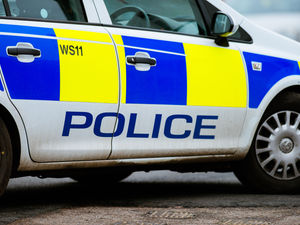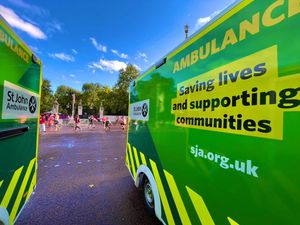WATCH: ‘It’s not easy' - Inside Wolverhampton's taxi licence test room
‘Our licensing process is the best and the strongest there is. I’d put it up against any other in the country.’
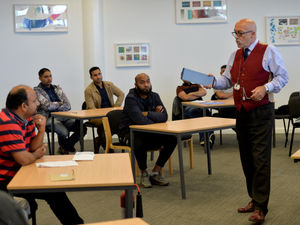
Nigel Todd has had enough of people criticising Wolverhampton Council’s private hire licensing system.
The 60-year-old former paratrooper and police officer has been delivering licensing courses for 16 years, and he is adamant that the city’s current process offers the best service out there.
In recent months he has felt like he is in the minority, as critics line up to accuse the council of doling out licences fast and cheap in an effort to make a quick buck.
WATCH: Behind-the-scenes of taxi licence test session
“A lot of the criticism is completely unfair,” says Nigel, who heads a team of three that run training programmes as part of a joint initiative between Wolverhampton and Worcestershire County Council.
“It is rubbish to say it is easy to get a licence here. We have a 44 per cent failure rate. Just because the process is easy does not mean it is easy to pass.”
The council charges £69 for a licence – far lower than most other authorities – and drivers can be licensed in just 20 days.
Express & Star comment: There’s no end in sight for Wolverhampton taxi row
It means Wolverhampton has become the go-to place for licence hunters not just from Bradley and Bradmore, but from Billericay, Bolton, Bath and hundreds of other towns and cities.
Some other local authorities are annoyed. Aside from the fact that their own licensing coffers are dwindling, they say that ‘cross-border’ hiring means drivers with a Wolverhampton licence can operate in their areas with little or no checks.
Wolverhampton cabbies are not happy either, arguing that the ease of obtaining a licence means the city’s roads are flooded with new drivers.
But the system has certainly proved popular with out-of-towners, who have flocked to the city in their thousands to get a licence.
The evidence is in the numbers.
The council gave out 9,388 licences over the last year, up from 852 three years ago, bringing in £2.2 million.
It has been made possible by the 2015 Deregulation Act, which allowed licensed drivers to operate anywhere in the country.
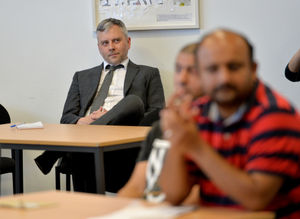
Anyone applying in Wolverhampton must attend a four-hour training session, including guidance on conditions of licence, disability awareness, child sexual exploitation and safeguarding. It is followed by a multiple-choice test.
A recent class at the Bert Williams Leisure Centre was attended by 14 candidates, including people from Rochdale, Nottingham, Derby, Coventry, Birmingham and Sandwell.
One driver was from Wolverhampton.
It highlights one of the major criticisms the city has faced.
If a driver from say, Weymouth, is licensed in Wolverhampton, there is surely no way they can be checked on by the city once they are operating four hours away down on the south coast?
“Not true,” says Nigel, pointing out that compliance officers from Wolverhampton regularly carry out checks in other local authority areas.
He says they recently visited Southampton and went out with police, stopping Wolverhampton licensed vehicles to make sure they were not breaking the law.
“We’re not letting people run wild when they are out of the area. We will check on them to make sure they obey our rules. We go to other areas and ask them if they would like to run joint compliance exercises with us, and some of them say ‘no, you’ve caused the problem you fix it’.
“It would be better if they worked with us instead of against us.”
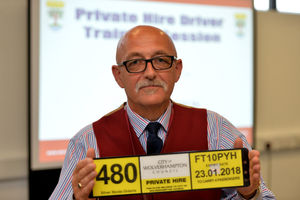
Wolverhampton’s training course contains no formal English test – another criticism often levelled at the authority.
Instead drivers’ grasp of the lingo is tested through an informal chat, followed by a series of job related questions posed by a training officer in private.
One man produces a French licence as ID and is clearly struggling to understand English. He is asked to leave the course, as is another gentleman who greets the question ‘Where are you from?’ with a blank look.
Concerns have also been raised over a wider public safety issue, with the authority accused of failing to carry out stringent criminal records checks or checks to see if drivers have been banned elsewhere.
“You have to be a fit and proper person to be a driver and there is an enhanced DBS check and checks to see if they have been licensed with other authorities,” said Nigel.
“There is no central database to check whether drivers have been refused by other authorities – although there is talk of that happening and I think everyone would agree it is a good idea.”
So why are so many people coming to Wolverhampton for a licence?
Athikur Rahman, from Birmingham, said: “The process takes a lot longer in Birmingham. In Wolverhampton it is very quick. If I get a licence I get the choice to drive in Wolverhampton or Birmingham.”
At the end of the session, six out of the original group of 14 – 43 per cent – have passed and will be licensed by the city as private hire drivers. Later that day in another session the pass rate was again 6/14.
While Nigel argues that the pass rate is low, for other local authorities it is potentially 12 drivers that could have been licensed in their areas.
And for Wolverhampton drivers, it is 12 newbies who may be competing with them for custom.
As far as Nigel is concerned, it is a simple case of supply and demand, with Wolverhampton better than others at responding to the 2015 law change.
“Wolverhampton Council did not change the law, it changed with the law,” he said.
“We are providing a fantastic service at a cheaper price. How is that wrong?”

